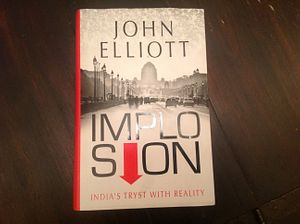Foreign visitors in ancient and medieval times played a great role in informing India and the world outside about the South Asian nation’s culture, polity, and society. Their accounts help us in filling in the gaps that historians often encounter due to a lack of sufficient written indigenous documents about our past. Greek ambassador Megasthenes’ visit to India in 3rd century BC acts as a great source of information about the Mauryan empire, for example. Chinese visitors Faxian’s and Xuanzang’s sojourns in India in the pre-Medieval period and their writings help us understand many things about our own past. Post-1000 AD, Al Biruni, Ibn Battuta, and Marco Polo enter the picture.
The trend continues in modern India also, but today the lead is being taken by journalists. Some of the foreign correspondents who have spent a considerable amount of time in India end up offering their impressions of the country. The latest entrant in the club is John Elliott, a former reporter with the Financial Times and a regular contributor to many renowned international dailies and magazines. He has popular blog called “Riding the Elephant.”
His book Implosion:India’s Tryst with Reality is an attempt to understand modern India and its failures. He tries to shed light on why India has failed to grow despite having such huge potential. He questions the political leadership for what he calls “lack of focus and drive.”
In his three decade-long association with South Asia, particularly with India, Elliott has been witness to momentous change in the nascent democracy. He has seen India emerging from a laidback economy to a very vibrant one. Yet he feels “India punches below its weight, failing to achieve what it could and should be doing.” The British journalist rues that despite having “abundant natural resources and ancient culture, yet [India] constantly disappoints admirers and validates the views of critics.”
Is this the lament of an ardent admirer of India or evidence of a misplaced understanding of a country which can’t be analyzed under one single narrative?
“As a journalist, it is not a case of being happy or unhappy, but to observe, report and analyze. That is what I have done, looking at where and how India is or is not succeeding and then examining trends,” says the veteran journalist in an interview with The Diplomat.
The book underlines that, despite varying success as a nation state, the country lacks a vision and urge to excel. The author believes that it’s not any “drive” other than “jugad” (making do and innovating with what is available) that is running this diverse country which is full of complexities and contradictions. He cites institutional weaknesses and lack of proper system in place for the ills affecting the country.
Elliott tirelessly tries to deconstruct India and lays bare its weaknesses and its underachievements. He finds faults with the Planning Commission. He underlines the lost opportunity after opening up of the economy in 1991 and how the country, which should have been bubbling with optimism, is “suffering from poor governance and endemic corruption.”
The author takes a historical perspective but recent developments – including anti-corruption protests, the slowdown in the economy, lack of governance, etc – seem to be shaping the mood of the book.
This rather unpalatable portrayal of the country, which at times borders on negativity, does not go down well with readers like me who have been witness to the landmark changes the country has undergone in the past two decades. The change has brought about a new optimism and opportunities never witnessed before.
Anand Giridharadas in his book India Calling: An Intimate Portrait of a Nation’s Remaking better reflects the new mood sweeping the nation. In his book, the American-born Indian author talks about his encounter with new India and how the new country is different from the ones his parents left in 1970s for greener pastures in the U.S.A. This stepchild of India finds the land of his parents full of hopes that are transforming lives not only in the big cities but also in small places. Giridharadas portrays the character of a young man, a son of a porter, who becomes a local Dale Carnegie in the Umred area of Nagpur district because he has the opportunity to do something different from what his ancestors did. The book is full of such characters who are transforming their lives in ways unimaginable by their forefathers.
Elliott’s Implosion, despite being informative and analytical, misses the mood and pulse of new India, which is bubbling with new hope.
Elliott predicts an implosion if the country is allowed to continue on its current trajectory. He writes that “ if it does, the system will deteriorate further, possibly leading to implosions as the functioning of institutions is undermined and destroyed.”
The advantage with foreign writers is that they are often detached and can see things in a way a native reader and writer can’t. But this detachment is also a weakness. It inhibits an understanding of the nuances of the country, which is still struggling to do away with so much colonial inheritance. The book fails to understand the undercurrent of hopes sweeping the nation.
Elliott’s book might disappoint an Indian reader. This was in witness when the book came to be discussed in the Foreign Correspondents’ Club in New Delhi couple of weeks ago. The audience expressed discomfort with the journalist’s account of modern India. There was a general consensus that India is not a negative story but a narrative of hope.
Nevertheless, Implosion is a timely book and interpretation of modern India. If ancient India suffers from a deficiency in written materials, modern India has more than enough of them. But one thing, however, remains the same: a foreigner’s account of India will differ in approach and understanding from a native writer. Both help in enriching our worldview.

































